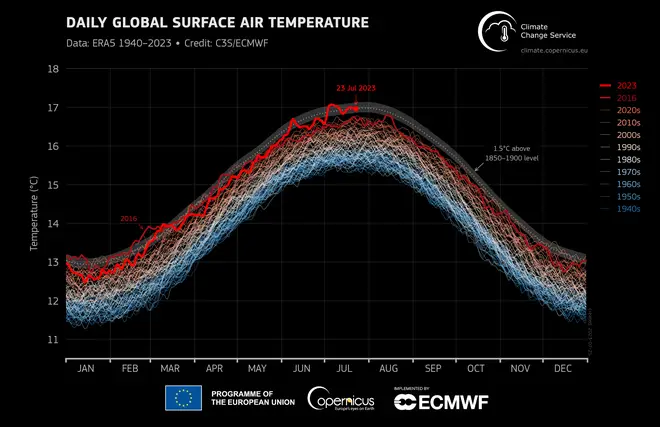
Iain Dale 10am - 1pm
4 August 2023, 09:04

The world's oceans have hit their hottest ever recorded temperature, as climate change is blamed for the stark rise in mercury levels affecting our seas.
According to newly released figures, the average daily global sea surface temperature this week surpassed the record set in 2016.
Compiled by the Copernicus Climate Change Service - the EU's climate change service, the stark temperatures look set to have dire implications where sea life is concerned, with one scientist warning of a "foretaste of the future".
The numbers released by the research group showed temperatures peaking at 20.96 degrees celsius, far above the average for July and August due to heatwaves across North Africa and Europe.
According to Copernicus, the first three weeks of July proved to be the warmest three-week period on record, with the planet on track to become the hottest July and the hottest month on record.

Soaking up heat from the atmosphere, the concerning sea temperatures will have a knock-on effect where the planet is concerned.
With temperatures impacting sea life, the movements of sea mammals and fish have been drastically altered as they search for cooler waters.
The world's oceans also produce half of Earth's oxygen and driving global weather patterns.
“The extreme weather which has affected many millions of people in July is unfortunately the harsh reality of climate change and a foretaste of the future,” said World Meteorological Organization’s Secretary-General, Professor Petteri Taalas.
“The need to reduce greenhouse gas emissions is more urgent than ever before. Climate action is not a luxury but a must.”
The Copernicus Climate Change Service, a research firm funded by the EU, compile date on the past, present and future implications of climate change.
Temperatures are linked to heatwaves in large parts of North America, Asia and Europe, according to the service.
It also notes that wildfires in Canada and Greece have had major impacts on health, the environment and economies around the world.

“Record-breaking temperatures are part of the trend of drastic increases in global temperatures. Anthropogenic emissions are ultimately the main driver of these rising temperatures,” explained Carlo Buontempo, Director of the Copernicus Climate Change Service.
Anthropogenic emissions are defined as emissions including greenhouse gases and aerosols which are produced by human activity.
"July’s record is unlikely to remain isolated this year," Mr Buontempo added.
On Thursday police said they had been "managing the situation" after being alerted to the activists climbing the family home of Prime Minister Rishi Sunak in Kirby Sigston, near Northallerton.
Called at around 8am, Greenpeace protesters slung black material over the home of the PM while Mr Sunak, his wife and children were on holiday in California.
Two men and two women had been arrested on suspicion of causing criminal damage and public nuisance. A fifth man was later arrested on suspicion of causing public nuisance.
The action came as a result of 100 new oil and gas licenses being granted despite soaring global temperatures linked to global emissions.